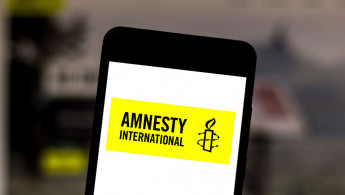Criticism surges against Amnesty International's German branch during visit to Ramallah
Criticism erupted in Palestinian public opinion against Amnesty International's German branch after a visit to Ramallah by a delegation of the human rights organisation.
On Tuesday, 23 January, a delegation of Amnesty International visited Ramallah in the occupied West Bank and met several Palestinian human rights organisations. The delegation included several senior directors of the organisation and members of its German branch.
The visit followed meetings between the delegation, Israeli NGOs and other Israeli groups. Multiple sources in Palestinian NGOs, all of whom asked not to be named, told The New Arab and other media outlets, before the visit, that the delegation had been planned only to visit Israel and that the Palestinian territories were only included later.
Amnesty International however denied this claim, and told TNA that "Amnesty Germany’s visit was always intended to be a trip to Israel and the Occupied Palestinian Territories since a key aim of the trip was to gain a better understanding of the human rights situation on the ground".
... several hours after that call @amnesty_de turned the report invisible. Check the contrast between serveral international AI pages featuring the #Apartheid report prominently- sole exception: Germany. Progressive except for Palestine! pic.twitter.com/nq2c0Mmlum
— BT3P Team (@BT3Pteam) February 3, 2022
On Wednesday, a local Palestinian news site 'Ultra Palestine' published a critical report about the visit and the Palestinian NGOs' meetings with the delegation, pointing out Amnesty Germany's previous stands towards Palestine.
The report noted Amnesty Germany's support to Amnesty's Israeli branch, despite Amnesty Israel's failure to call for a ceasefire during the current Israeli assault on Gaza and despite the branch publishing a statement which promoted provenly false and inaccurate Israeli narrative on 7 October's events.
The report also indicated Amnesty Germany's discrepancies with Amnesty International's general positions on Palestine. The most significant of these was Amnesty Germany's hesitance to endorse Amnesty International's report of 2022 accusing Israel of the crime of Apartheid.
Amnesty International told TNA that its delegation is conducting "a working visit to Israel and the Occupied Palestinian Territories (OPT) to meet with local NGOs, victims of human rights violations and other communities".
Amnesty supporters around the world are calling for a ceasefire in Gaza. Humanity must prevail.
— AmnestyCanada (@AmnestyNow) November 16, 2023
Visit our Israel/OPT country page to find out what you can do to help 👇 https://t.co/Sk4mZng1wl
Amnesty also said that senior Amnesty International directors led the delegation, which included members of the German section, who "joined the trip to gain a deeper understanding of the human rights situation on the ground in Israel and the Occupied Palestinian Territories to communicate more effectively about human rights violations, including life under Israel's system of apartheid, to their national audiences, as well as to strengthen campaigning efforts and advocacy with the German authorities".
Germany's criminalisation of solidarity actions with Palestinians has been condemned by Amnesty International, including its German branch. But Amnesty Germany's condemnation of the German state's crackdown on Palestine solidarity and criminalisation of criticism against Israel was also denounced as not up to Amnesty International's standards, according to Ultra Palestine's report.
Last year in May, Amnesty Germany published a legal analysis of the Berlin Assembly Authority's blanket bans on demonstrations to commemorate the Palestinian Nakba. The report stated that the bans violated the rights to assembly and protest. It urged German authorities "to give full and careful consideration to less restrictive measures" and said that restrictions to these rights must be "proportionate" and "content neutral".
Although the report didn't refer to Germany's systematic crackdown on Palestine solidarity, it did point out the German authorities' discriminatory justification of the bans based on the ethnicity and the age of protesters, slamming it as an expression of "institutionalised racism", which exposed "discriminatory stereotypes and anti-Arab racism intersecting with anti-Muslim racism against a whole demographic group".
"International human rights associations have advanced positions on Palestine, although sometimes they can be more courageous", Ubai Aboudi, director of the Bisan Center for Research and Development, told TNA.
"I believe that we need to meet and work with these organisations based on the common ground that we have", said Aboudi.
"It is true, though, that despite the official policy of these organisations, some individuals who work in them have personal anti-Palestinian stands influenced by racist views, and it sometimes becomes visible in many ways, and we need to discuss this with our partners", he added.
Amnesty International called for a ceasefire in Gaza on 26 October and recognised the "risk of genocide" on 10 January, as Israel's war on Gaza at the time had killed around 18,000 Palestinians in the Gaza Strip, 70% of whom were women and children.
Israel continues its war on the besieged coastal enclave, so far killing around 30,000 Palestinians since 7 October, including more than 10,000 children and 7,000 women. About 90% of the Palestinian population in Gaza has been displaced, while Israeli forces continue to destroy most of the strip's civilian infrastructure.
The UN warned that a 'hellish scenario' is taking place in the Gaza Strip, aggravated by Israel's total blockade of food, medicine, electricity and fuel, as well as the destruction or disabling of hospitals.





 Follow the Middle East's top stories in English at The New Arab on Google News
Follow the Middle East's top stories in English at The New Arab on Google News


